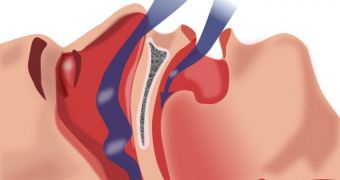In a paper published in the April issue of the scientific journal SLEEP, researchers from the US Centers for Disease Control and Prevention (CDC) say that people who experience sleep apnea are more likely to become depressed.
For the new research, scientists investigated more than 9,700 American adults, all of which were a part of the first, nationally-representative sample population put together specifically to test this connection.
Sleep apnea is a condition which causes that collapse of superior airways during sleep. People who suffer from this disorder stop breathing several times per night, sometimes for intervals of up 15 or 20 seconds. During this time, their brains are starved of oxygen.
The condition does not allow patients to get a good night's sleep regardless of how tired they are, and the constant fatigue is one of the reasons why so many of them go on to develop depression. A more severe form of the condition is called obstructive sleep apnea (OSA).
What the new research demonstrated was that this condition led to major depression even after experts checked for the influence of other known factors, such as for example race, gender, weight and age. Weirdly enough, scientists found no link connecting snoring with the development of depression.
“Snorting, gasping or stopping breathing while asleep was associated with nearly all depression symptoms, including feeling hopeless and feeling like a failure,” Anne G. Wheaton, PhD, explains, quoted by PsychCentral.
“We expected persons with sleep-disordered breathing to report trouble sleeping or sleeping too much, or feeling tired and having little energy, but not the other symptoms,” adds the expert, who was also the lead author of the new investigation.
One of the main issues associated with OSA is the fact that the condition is severely under-diagnosed. Most often, patients do not even know they have it, since detection is only possible in a sleep lab, or if an individual's spouse or partner stays awake to monitor their breathing.
The disorder can be treated using surgery or other approaches, doctors say, but detecting it as early as possible is very important. The new study suggests that depression could be used as an indicator for finding OSA.

 14 DAY TRIAL //
14 DAY TRIAL //